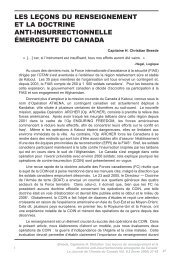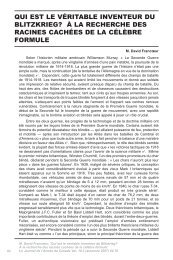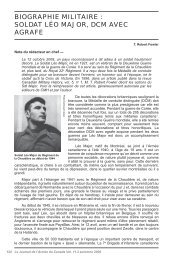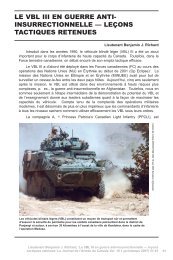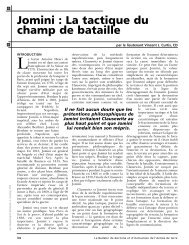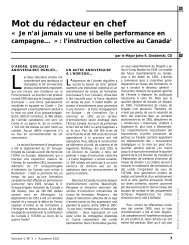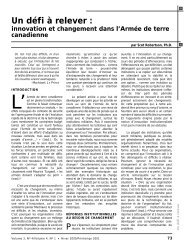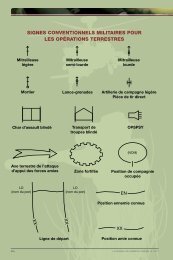The Canadian Army Journal
The Canadian Army Journal
The Canadian Army Journal
You also want an ePaper? Increase the reach of your titles
YUMPU automatically turns print PDFs into web optimized ePapers that Google loves.
What has been demonstrated in this section is that the use of the private military<br />
industry by the CF has been down a path traveled primarily by the US, but also by other<br />
western nations, such as the UK and Australia, which have had similar experiences. It<br />
first began with contracted logistics support and has moved into training of recruits and<br />
basic occupation training, long considered “core” areas by militaries. What remains to<br />
be seen is whether this will be a solution to a problem that is viewed by the <strong>Army</strong><br />
leadership as temporary, or whether this becomes a permanent and expanding feature<br />
in the CF training system. <strong>The</strong> CF challenge in dealing with the dual issues of<br />
operational tempo and a simultaneous attempt to expand means that this pressure will<br />
not let up for the foreseeable future, and that the next logical path to move along would<br />
be the use of MPFs to provide armed services to the CF on the battlefield.<br />
<strong>The</strong> Move to Military Provider Firms<br />
<strong>The</strong> previous section demonstrated that western armies in the post-Cold War era<br />
have all followed a similar pattern with regard to the increasing privatization of functions<br />
once considered the sole purview of the military. <strong>The</strong> next step was the employment of<br />
MPFs to support military and government goals. This has always been the smallest and<br />
most controversial areas of operations for private military companies, but saw an<br />
explosion of these services during the second Iraq war and in Afghanistan.<br />
David Isenberg points out that MPFs operating in Iraq provide three types of<br />
services: close protection for senior civilian officials, non-military site security (buildings<br />
and infrastructure), and non-military convoy security. Isenberg argues that most of these<br />
MPFs work for organizations other than the US government or the Coalition Provisional<br />
Authority (CPA). 42 This may be slightly deceptive as all private military contractors who<br />
work in Iraq must register with and come under the authority of the CPA. This means,<br />
in effect, that they are under the de facto authority of the US Military. 43 While previously<br />
mentioned that the CPA has ceased to exist with the return of power to an Iraqi<br />
government, there is little control exerted by Iraqis over MPFs working inside the country.<br />
In general, the private military companies are contracted by the US State Department<br />
and others providing security for a myriad of other coalition operations. US State<br />
Department rules are strict with regard to hired companies being American and that the<br />
personnel employed by these firms are American citizens. Those firms employed by<br />
other US government agencies and other private interests can be any combination of<br />
personnel from most any country. 44 CPA rules limit the weapons these MPFs may use<br />
to small arms with ammunition as large as 7.62 mm. Also, US <strong>Army</strong> regulations allow<br />
MSFs to be armed when required by their combatant commander. 45<br />
<strong>The</strong> scope of operations that MPFs were undertaking in Iraq and the reliance the<br />
Pentagon had on these firms was large. MPFs were being used to guard reconstruction<br />
projects and protect the Chief of the CPA. <strong>The</strong>y were also hired to defend 15 regional<br />
authority headquarters and were entrusted with security in the Green Zone of Baghdad. 46<br />
While these tasks were primarily defensive in nature (i.e., protecting people and things),<br />
MPFs have been involved in combat. Contractors with the security firm Blackwater<br />
engaged in a firefight in Najaf, Iraq, fighting to save the UN administrators at the<br />
headquarters. Blackwater resupplied their own personnel during the firefight through<br />
their private helicopters. A British firm, Hart Security, also found itself engaged in a<br />
firefight to protect a local construction project. 47 <strong>The</strong>re are other examples, but these two<br />
specific ones indicate that MPFs, within the US context in contemporary Iraq, have now<br />
been employed by the US Government to carry out tasks for which there are too few<br />
troops to do. This may be a trend that Canada cannot remain immune. Canada has<br />
accepted a prominent role in the counter-insurgency fight and reconstruction efforts in<br />
Afghanistan, which will put a tremendous strain on the CF, particularly the <strong>Army</strong>. This<br />
<strong>Canadian</strong> <strong>Army</strong> <strong>Journal</strong> Vol. 11.1 Spring 2008<br />
89


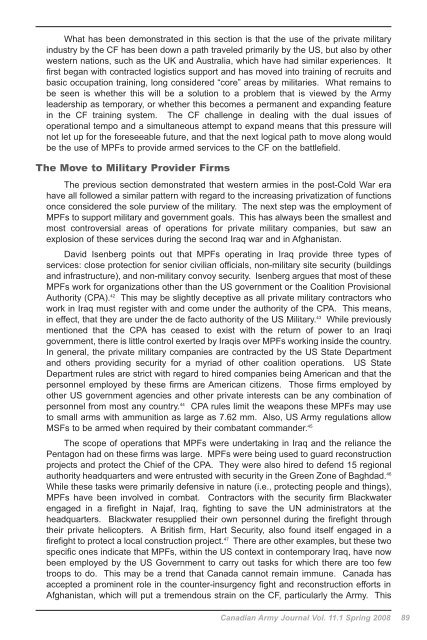
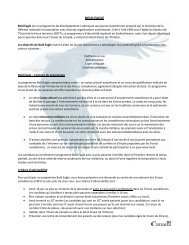

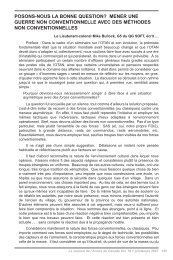
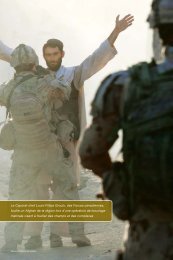
![La modularite dans l'Armee de terre canadienne [pdf 1.6 MB]](https://img.yumpu.com/17197737/1/188x260/la-modularite-dans-larmee-de-terre-canadienne-pdf-16-mb.jpg?quality=85)
